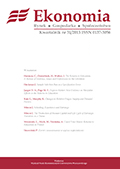Gender Wage Gap in Urban China
Y. Ni
ABSTRACT: This paper analyses the gender wage gap and returns to education in urban China using data collected from Fangshan, Beijing. The traditional Oaxaca decomposition shows that the unexplained part seems to dominate the gender wage gap in urban China. The Appleton decomposition, which takes into account sectoral location, shows that the gender gap is mostly within sector and most of the intra-sector wage gap is unexplained. The gender pay differential due to sectoral location is small; in fact, the overall sectoral location favours female in urban China.
Full text (PDF)
Issue number: 17
In this issue:
Światowy fenomen chińskiej dynamiki ekonomicznej
M. Dobroczyński
ABSTRACT |
PDF
From the end of the seventies Chinese economic achievements attracted the whole world's unflagging attention. The sources of the long-lasting development success are many while the specific conditions of modern Chinese uniqueness should be searched even in many thousand of years of shaping a different civilization. Thus, to some degree it concerns also separate elements of the current strategic and tactical concepts, and especially the dynamic economic growth philosophy on the market terms-with only some aberrations, at the same time keeping the authoritarian political system that liberalizes itself insignificantly and slowly.
After many years of rapid growth China gained export surpluses not only when it comes to the traditional consumable articles but also in the area of electronics, certain industrial appliances etc., which shows the gradually growing industrial versatility. With strong development of its own scientific-research area, it is also important that foreign direct investments from many world countries, including Taiwan, enter the Chinese market in record quantities. Chinese development dynamics already caused significant prosperity growth in some regions, however, chosen parts of the rural economy stay outside the area of the intensive growth. One also has to notice that the extremely quick growth creates potentially different kinds of threats to the economic balance and structural transformation in China.
Mobilność oszczędzania gospodarstw domowych w Polsce
Z. Liberda, M. Pęczkowski
ABSTRACT |
PDF
In this paper we analyse the saving mobility of Polish households, e.g. the mobility of households between classes of different saving rates. The analysis is based on the household budget panel data of 3001 Polish households surveyed in the same month during four consecutive years. The panel sample group was selected by authors from 30 000 households' surveyed by Polish Central Statistical Office each year. We apply the Markov mobility matrices. The long term ergodic structure of households with regard to saving rates is estimated. It illustrates the probability of a household to fall into one of the saving rates range.
Our results show that during four consecutive years (1997-2000), one third of the households which saved less than 20% of the household disposable income remained in their class. In the class of households that saved more than 20% of the household disposable income half of the households kept these high saving rates.
In the long term, the probability of falling into a group of households with lowest saving is 0.2. Groups falling into -20% to -5% and -5% to 5% saving rates would be the least numerous. The highest probability (0.3) was to get into a group that saved more than 20% of the household disposable income. It shows the tendency towards polarization of the households with regard to saving rates.
Teoretyczne przesłanki ograniczonej skuteczności sterylizowanych interwencji walutowych
A. Koronowski
ABSTRACT |
PDF
The subject of the article is the theoretical aspects of the effectiveness of the sterilized currency intervention as a means to stabilize the fixed rate. Effectiveness of currency intervention, especially sterilized, is the subject of continuous controversy the resolution of which is searched for in more and more numerous statistical-econometrical empirical studies. In the face of contradictory and ambiguous study results as well as cursory empirical observation a particularly great importance should be attached to theoretical arguments that would provide a ground for interpretation and understanding of empirical observations. The main part of the article constitutes a critical overview of the theoretical views on the ways in which intervention influences the exchange rate. The conducted analysis leads to a conclusion that currency interventions directed to protect the rate level may in some cases be effective, but in others they may be ineffective. Such conclusion is perfectly consistent with the experience gathered. Contrary to the empirical analysis the theoretical perspective allows to look into the intervention mechanism and define the factors that may determine the effectiveness of intervention.
Metody oceny efektywności operacyjnej banków detalicznych
A. Kulczycki, D. Sikora
ABSTRACT |
PDF
The purpose of this article is to investigate, from the empirical side, whether the selection of a method of assessment of bank branches operational performance determines the results. For this purpose the theoretical model was constructed exposing the definition of operational efficiency and the approach to its measuring. The authors focus on three standard methods of efficiency analysis: Data Envelopment Analysis, Stochastic Frontiers and Corrected Least Squares Method. The empirical research was carried out with the use of the data for one of the largest Polish retail banks covering 37 bank branches during the first half of 2005. The selection of variables included number of operations, financial and non-financial inputs such as number of employees, space, number of ATMs, etc. The results generated by SF and COLS procedures were similar and differed significantly from DEA results. On the basis of structure analysis it appeared that DEA method tended to overvalue the efficiency of the small branches, which leads to statistically significant differences between the results.
Gender Wage Gap in Urban China
Y. Ni
ABSTRACT |
PDF
This paper analyses the gender wage gap and returns to education in urban China using data collected from Fangshan, Beijing. The traditional Oaxaca decomposition shows that the unexplained part seems to dominate the gender wage gap in urban China. The Appleton decomposition, which takes into account sectoral location, shows that the gender gap is mostly within sector and most of the intra-sector wage gap is unexplained. The gender pay differential due to sectoral location is small; in fact, the overall sectoral location favours female in urban China.
Tendencje na rynku nieruchomości biurowych
B. Śliwiński
ABSTRACT |
PDF
The aim of this article is the analysis of the phenomena occurring on the office space market. The space market was indicated as determining the behaviour of developers and the asset market. The analysis of the space market, however, cannot be done without observing the decision conditions of the lessee, such as: the choice of the location, the choice of the class of the office space, changes in the work practices or the correlation between the space taken up by the company and the level of its business activity. Conditions on the space market in the 4Q Dipasquali-Wheaton model gained the importance of a basic factor, defining the height of the rate of capitalization being de facto the rate of the refund of investment in the commercial real estate. In the article the office space market in Warsaw in the years 2000-2004 was analized according to the principles in the model.
Impact of integrated European business environment on SMEs cooperation strategies
M. Najda, K. Wach
ABSTRACT |
PDF
The article elaborates on conditions for SMEs in the EU and Poland as far as integrated EU business environment is concerned. It also focuses on the important role of the EU policy and integrated business environment on the cooperation strategies among SMEs. Although it was not the intention of the EU, the integration process favours Large-sized Enterprises in the run for market success. Yet, it does not mean that SMEs are on the lost position. Owing to the EU integration, value creation processes take place within transnational or interregional networks of suppliers, customers, competitors. Nowadays, more and more products offered on the worldwide market are becoming effects of complex systems. The analysis of detailed effects of that influence should be the subject of further research. e

